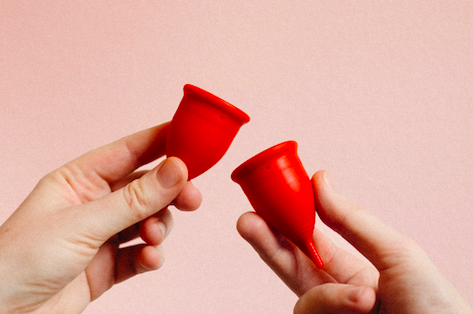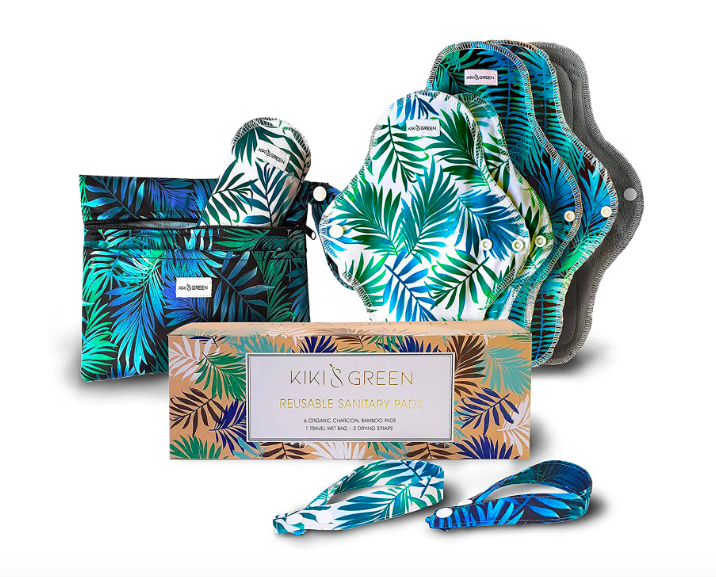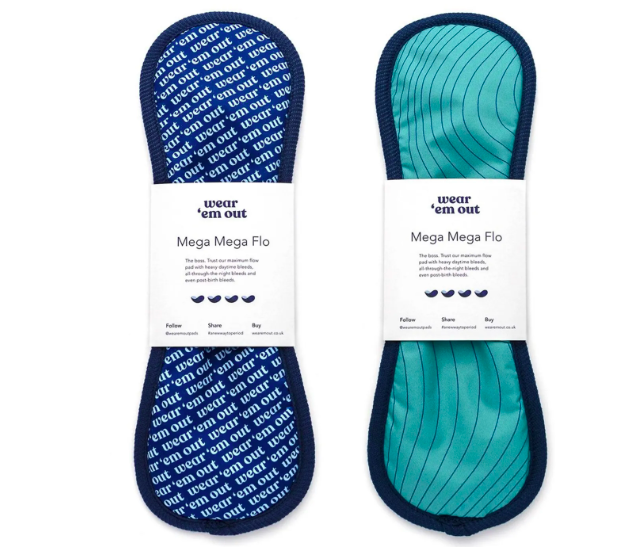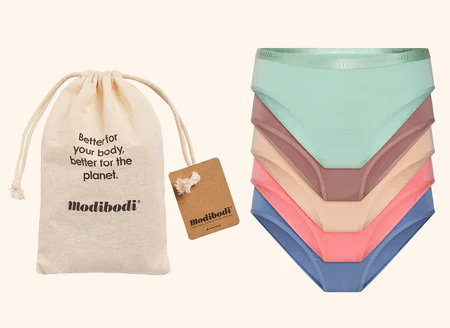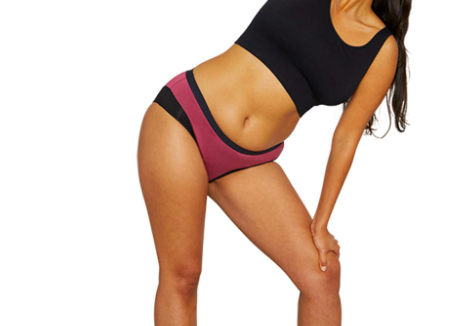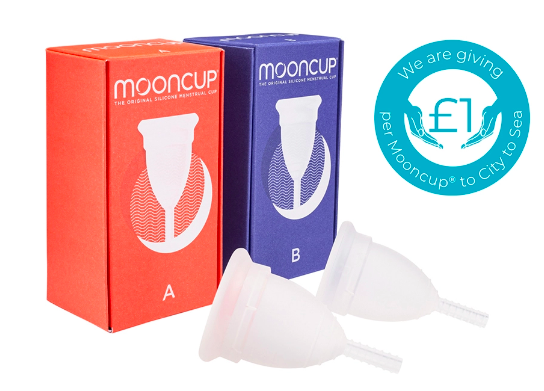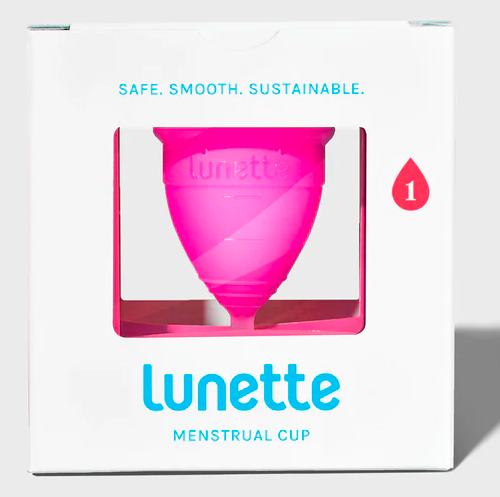5 big reasons to buy into reusable period products
low tox, waste free periods
Save money, help the planet, and embrace a low tox life. NOW’s the time to make the switch to reusable period products.
You may have noticed more period pants and menstrual cups popping up in big retailers across the UK — YESSS to progress!
In large part, this is thanks to some great campaigns by WEN (the Women’s Environmental Network), CitytoSea, Hey Girls and the environmental activist Ella Daish.
But still, lots of women and girls are yet to make the switch to reusable period products. Why is this?
Research points to three or four main obstacles: financial constraints (now a bigger issue than ever, due to rising living costs), fears around effectiveness and leaking, preconceptions of the products themselves, plus a vague aversion towards dealing more directly with our menstrual blood. But times and attitudes are-a-changing, friends, and given the way the world is heading, change is well overdue.
Here are some MAJOR reasons to give reusables a try, be it the menstrual cup, bamboo or cloth pads, or those super-clever period pants…
Ella Daish’s campaign has lead to retailers removing plastic tampon applicators from their products, and sparked others to develop sustainable ranges. #ENDPERIODPLASTIC
Investing in a menstrual cup, reusable liners or period pants is something we might have talked ourselves out of in the past, but now with prices getting lower (£8 at M&S, my last check), and comfort and design better than ever, those reasons are far less valid than they once were.
The question then stands, if we can make our periods waste-free, plastic free, and toxin-free, why on earth wouldn’t we!? First, some facts.
Did you know, standard period pads consist of around 90% plastic, and that a pack can contain as much as 5 plastic bags. Many don’t realise the string and applicators that come with tampons are often plastic too.. OR that disposable period products will end up sitting in landfill for around 500 years, unless of course they wind up in our oceans.
On top of plastic pollution, there’s the issue of toxins. Ingredients and product materials are still not fully disclosed on packaging due to an appalling lack of industry regulation. (WEN has campaigns on this at the moment that you can get behind)
Worryingly, conventional tampons contain toxic dioxins, pesticides and undisclosed fragrances, all of which can pose serious risks to our health.
Beyond campaigning for greater transparency from period product manufacturers, WEN and CitytoSea are working to improve access for all menstruating people to eco-friendlier period products.
After all, arguably what’s most tragic is the situation for millions of women and girls across the world - without access to even disposable period products who would likely jump at the chance of owning a reusable product.
The excellent charity, Bloody Good Period, is doing some great work in the fight against period poverty, including among refugee and asylum-seeking women, and helping normalise periods through education. So while we support these ongoing campaigns, we can also get on board with reusable period products.
Here are 5 major reasons why we’d want to…
Using a menstrual cup, period pants and/or reusable pads is significantly cheaper in the long-run.
In the UK, period products cost an average of £4,800 over one menstruating lifetime. But by switching to reusable period products people stand to save 94% of what they would’ve spent on disposable period products. (Source: CitytoSea). If it’s hard to justify the initial outlay, put aside a few pounds every week, or request it as a gift. (Period pants by the way are pretty, colourful, and feel lovely to wear — so they do make great gifts! — see point 3.)
Menstrual cups are easier to use than you think, safer, and far more sustainable.
Ok so I may have combined a few reasons in one, here. But who cares. The main theme of this point is freedom. Imagine not having to get rid of anything when you visit the toilet throughout your period. Instead, you just pull out your menstrual cup, empty its contents into the toilet, rinse it under the tap, and pop it back in again. Convenience is one thing, but talk about empowering?!
If you’re worried about leaking, you needn’t be. Simply use it in conjunction with period pants. If you’re used to inserting a tampon, you’ll find using a menstrual cup not much different. But the big advantage is there’s no vaginal dryness, risk of Toxic Shock Syndrome or the body’s absorption of unknown chemicals, which can’t be said for tampons. What’s more, a cup makes bacterial infections a lot less likely because there’s nothing to disrupt your pH levels.
Menstrual cups can last up to a decade, are vegan and cruelty-free, carry zero toxins, and as they’re generally made of silicone — which is a product of silica; a natural mineral and one of the most abundant on earth — they are hands-down the most sustainable option. Favourite brands include MoonCup, Lunette, Intimina, Pixie Cup and the Cora Cup. The right cup for you relates in part to your body shape so check out this great guide on the NYT or take an online quiz to suss out which to go for.
The Intimina Lily Cup.
3. Washable pads and pants are far more comfortable, effective and easy to wash than you realise.
Based on what my closest girlfriends said to me (who all were using disposable sanitary products this time last year but are no longer #howgoodisthat), there are pre-conceptions about period pants that put a lot of women off. My friend threw out words like “old lady”, “nappy-like” and “washing them…yuck” when I asked why she hadn’t tried them. One short Internet-browse later, and she’d ordered her first pair plus some for her daughter. And hasn’t looked back since.
There’s a reason for that. They surprise a lot of people, being more effective, more comfortable, and easier to wash than you first imagine. Most brands recommend running your pants under cold water (but not soaking) before throwing them into the washing machine on a gentle wash. They may take a little longer to dry because of the multi-layered gusset, but when it comes to wearing them they feel exactly like normal knickers — not at all heavy or bulky.
ModiBodi period pants can be thrown in the washing machine on a gentle cycle.
4. You can play a role in reducing landfill waste and ocean pollution.
More than 200,000 tonnes of tampons and plastic-containing sanitary pads are sent to UK landfills every year; which paints a bleak picture for the planet considering plastic takes around 500 years to break down. Ocean pollution is another huge issue linked to period product waste, due to vast amounts being flushed instead of binned. Currently around 2.5 million tampons, 1.4 million pads and 700,000 panty liners are flushed down the toilet every single day here in the UK. (Source: Southern Water). This isn’t just down to a lack of education, but linked to the shame society and cultures around the world have built around periods. Taboo and stigma towards our monthly bleeds is still very much part of the problem.
DID YOU KNOW…
Nearly half (48%) of girls aged 14-21 in the UK are embarrassed by their periods, and 49% of girls have missed an entire day of school because of their period, of which 59% felt compelled to make up a lie/excuse. (Source: PLAN International).
5. You’re protecting your health.
If the same levels of fragrance found in menstrual products were in cosmetic products, they would require mandatory labelling. Synthetic fragrances can harbour a cocktail of over 3,000 chemicals, potentially passing carcinogens, allergens, irritants and endocrine disrupting chemicals into our blood stream. Recent independent tests found a toxic cocktail of chemical residues in period products linked to cancer, developmental and reproductive disorders. Not so hard to believe, when you consider most mainstream period products are sold to us by the likes of Procter & Gamble, a company widely criticised for poor labour practises, deforestation and general lack of transparency.
PLAN International offer some excellent guides and an Act For Girls toolkit for inspiring change in your community.
SO what’s holding you back?
Here are some answers to common questions you might have…
I have heavy periods. Can period pants cope?
Period pants feature a built-in gusset (usually made of 3 or 4 layers of different fabrics) that absorbs blood and prevents leaks. Depending on the style and absorbency, they can hold different amounts of blood and can be worn for different amounts of times, some up to12 hours.
How comfortable are menstrual cups to wear?
Many people find wearing a menstrual cup more comfortable than tampons. It’s just a case of getting it into the right position, and if the size of the cup fits you well, you shouldn’t feel any pain or discomfort at all. You’re more likely to forget it’s there! The key thing is not to give up, if you feel like it’s not getting into the right place. There’s a range of different shapes and sizes based on the fact every menstruating person is different! Once you get there though, you’ll be so happy you kept with it.
Isn’t washing period pants a bit messy and gross?
In a word: No. You simply run the worn period pants under cold water tap before popping them into the washing machine on a cool wash. They can go in with all your other clothes. Job done. You never even see the blood. Also, they are breathable, anti-odour fabrics which don’t harbour any smells.
How do you use menstrual cups?
There is SO much information out there to guide you when you first use a menstrual cup. I think I read at least six blogs before taking the leap, all of which prepared me for what in the end felt like the simplest thing ever. In a nutshell, you keep your menstrual cup clean. Between cycles you sterilise in boiling water, but throughout the cycle you just rinse with water or very mild soapy water. You wet it under a tap, fold it, gently push it in and it springs into place. Less faff, less waste, less cost, and no toxic chemicals.
SOME OF THE ETHICAL GUIDE‘S FAVOURITE BRANDS… including: Kiki’s Green, wear ‘em out, MoonCup, Lunette Cup, ModiBodi, WUKA and Thinx.
SOME EXCELLENT RESOURCES WORTH CHECKING OUT….
City to Sea - Plastic Free Periods Resources Hub - find guides, posters, worksheets
WEN (Womens Environmental Network) - Environmenstrual Factsheet
Ella Daish’s Eco-Period Guide
(Sign Ella Daish’s petition to make all menstrual products plastic free - Change.org)PLAN UK - Menstruation — toolkits for change and putting an end to period taboos
HeyGirls - Everything you need to know to feel confident about periods
WUKA Blog - periods & sustainability tips and advice
The Better Period — How to Wash Period Underwear
〰️
#PERIODSWITHOUTPLASTIC
〰️
#ENDPERIODPLASTIC
〰️ #PERIODSWITHOUTPLASTIC 〰️ #ENDPERIODPLASTIC
By making the switch from tampons to menstrual cup, you can have 16 times less carbon impact, saving 7 kg CO2e over a year. That’s going to feel good in itself!
Changing the language of periods….
SOURCE: Bloody Good Period — bloodygoodperiod.com/normalise
Worth noting is that some people who have periods don’t identify as women – including trans men or non-binary folk. Everyone should be included in the conversation around periods, so let’s not solely refer to females when talking about periods.
